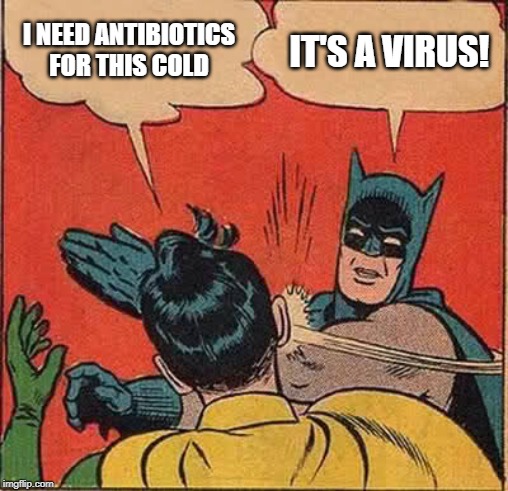New research out of the Francis Crick Institute in London found that antibiotics can worsen viral infections and increase mortality when viral exposure occurs. The research findings published in Cell Reports, “Microbiota-Driven Tonic Interferon Signals in Lung Stromal Cells Protect from Influenza Virus Infection” noted that:
“Our study argues that caution should be exercised when treating patients with antibiotics. Between 2000 and 2015, worldwide antibiotic consumption is believed to have increased by 65%, much of which may be linked to inappropriate treatment of pollution- and viral-based illnesses (Klein et al., 2018). Our results suggest that inappropriate use of oral antibiotics could predispose patients to more severe influenza, because of reduced antiviral resistance of the epithelia.” (source)
When mice with healthy gut bacteria were infected with the flu, approximately 80% of them survived. However, only a third survived if they were given antibiotics before being infected.
The researchers found that antibiotics increase the vulnerability of the lungs to flu viruses, leading to worse infections and symptoms. They found that the reason for the increase in severity of flu virus symptoms was because signals from gut bacteria helped to prepare the lining of the lungs for the viral infection, and made the viral infection less potent and deadly. When antibiotics wipe out the gut bacteria, they don’t signal for the lung linings to prepare for, and fight, the oncoming flu virus, and the virus is able to multiply and proliferate in the unprepared lung linings.
One of the study’s authors, Dr. Andreas Wack, stated:
“We were surprised to discover that the cells lining the lung, rather than immune cells, were responsible for early flu resistance induced by microbiota. Previous studies have focused on immune cells, but we found that the lining cells are more important for the crucial early stages of infection. They are the only place that the virus can multiply, so they are the key battleground in the fight against flu. Gut bacteria send a signal that keeps the cells lining the lung prepared, preventing the virus from multiplying so quickly.”
Gut bacteria are crucial for cell signaling, and both healthy gut bacteria and proper cell signaling are necessary for the body to mount a proper response to viral infections.
My primary response to this study is a desire to show it to everyone I know that insists on getting a prescription for antibiotics whenever he/she has the sniffles. DON’T TAKE ANTIBIOTICS FOR VIRAL INFECTIONS! They’re not only useless, they’re harmful. And they’re not only harmful because of their side-effects and because they encourage antibiotic resistance, they’re also harmful because disruption of the gut microbiome disrupts cell signaling and the ability of the body to prepare for the viral attack.
My secondary response is to wonder what the specific effect of fluoroquinolone antibiotics (ciprofloxacin, levofloxacin, moxifloxacin, ofloxacin, and a few others) is on cell signaling and our ability to fight viral infections. “Microbiota-Driven Tonic Interferon Signals in Lung Stromal Cells Protect from Influenza Virus Infection” isn’t about fluoroquinolones in any way other than peripherally – because fluoroquinolones are antibiotics. However, there have been some recent articles about how fluoroquinolones negatively affect cellular signaling. The study, “Antibiotic-induced release of small extracellular vesicles (exosomes) with surface-associated DNA” published in Nature, found that, “ciprofloxacin induced the release of both DNA (mitochondrial and chromosomal sequences) and DNA-binding proteins on the exofacial surfaces of small extracellular vesicles referred to in this paper as exosomes.” Exosomes are cell signaling molecules, and fluoroquinolones release DNA from them.
I honestly don’t have a hypothesis connecting these two studies, but I do wonder if there are connections. Are all antibiotics inhibiting cellular signaling? Are fluoroquinolones in particular inhibiting cellular signaling? What are the consequences? I am not sure at this point, but if you want to look into these possibilities, more information about FQs and cellular signaling can be found in the post, “Ciprofloxacin Depletes Exosomal DNA” and in “Nature’s Quinolones: The 4Qs” on FluoroquinoloneThyroid.com.
Antibiotics are consequential in ways that weren’t anticipated a decade or two ago. The links between microbial health and immune health are recent discoveries. The study “Microbiota-Driven Tonic Interferon Signals in Lung Stromal Cells Protect from Influenza Virus Infection” shows us that antibiotics actually make viral infections worse. Antibiotics are not benign drugs. They have severe side-effects (as described throughout this site, and to call them simply “side-effects” is an unfortunate understatement), and as discoveries about the importance of balance, health, and diversity of our microbial communities is uncovered, the full breadth of the damage done by these drugs is being uncovered. I’m not saying that they don’t have their place – they do – but they are consequential, and we should fully weigh the consequences before taking any antibiotics.
Sources:
Cell Reports, “Microbiota-Driven Tonic Interferon Signals in Lung Stromal Cells Protect from Influenza Virus Infection”
Science Daily, “Antibiotics weaken flu defenses in the lung”
*****











… [Trackback]
[…] Find More Information here to that Topic: floxiehope.com/study-finds-that-antibiotics-make-viral-infections-more-deadly/ […]
… [Trackback]
[…] Here you can find 69980 additional Information to that Topic: floxiehope.com/study-finds-that-antibiotics-make-viral-infections-more-deadly/ […]
… [Trackback]
[…] Read More Information here to that Topic: floxiehope.com/study-finds-that-antibiotics-make-viral-infections-more-deadly/ […]
… [Trackback]
[…] There you will find 26885 additional Info on that Topic: floxiehope.com/study-finds-that-antibiotics-make-viral-infections-more-deadly/ […]
… [Trackback]
[…] Here you can find 92572 additional Info on that Topic: floxiehope.com/study-finds-that-antibiotics-make-viral-infections-more-deadly/ […]
… [Trackback]
[…] Information on that Topic: floxiehope.com/study-finds-that-antibiotics-make-viral-infections-more-deadly/ […]
… [Trackback]
[…] Here you can find 36164 more Info on that Topic: floxiehope.com/study-finds-that-antibiotics-make-viral-infections-more-deadly/ […]
… [Trackback]
[…] Read More on that Topic: floxiehope.com/study-finds-that-antibiotics-make-viral-infections-more-deadly/ […]